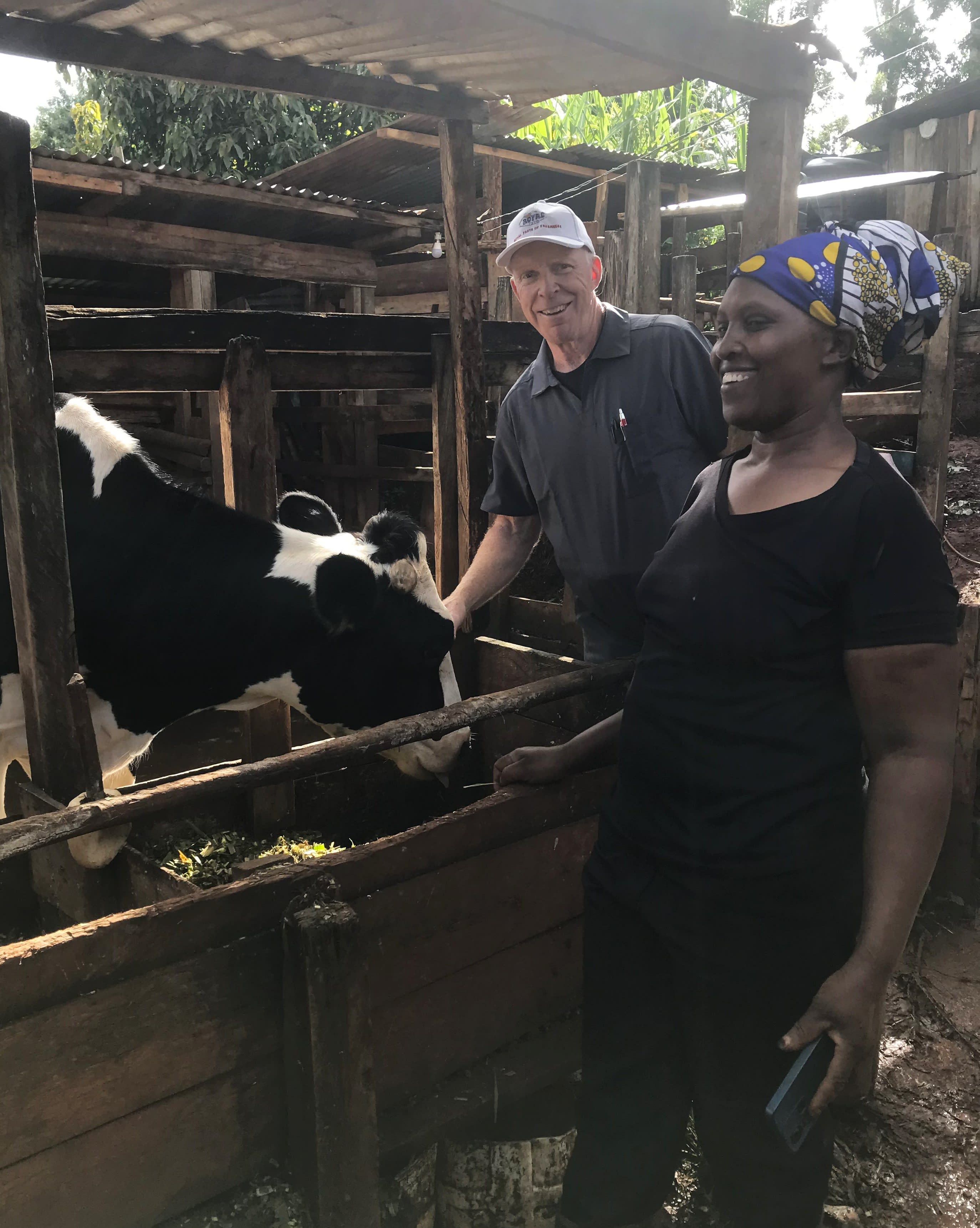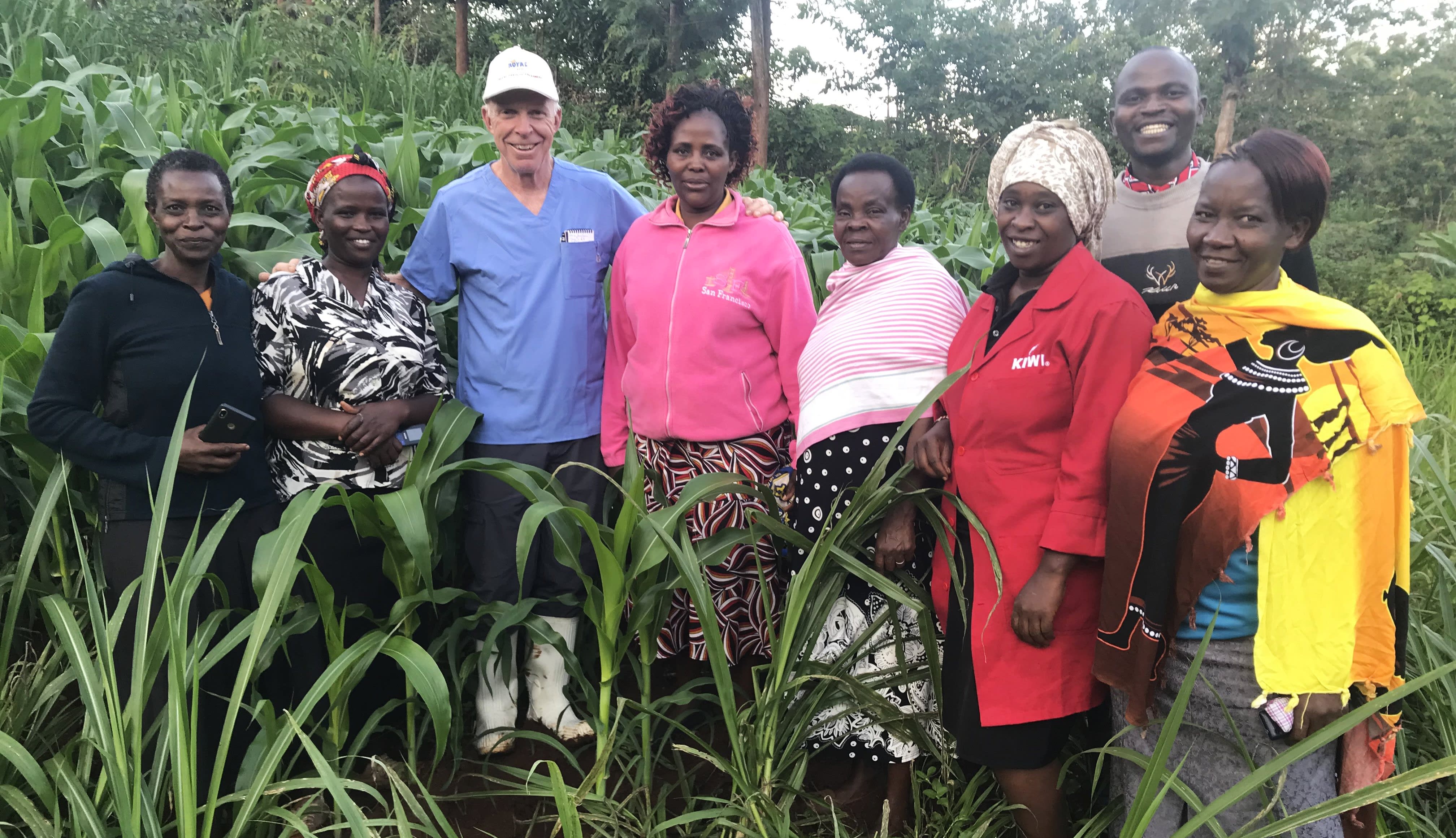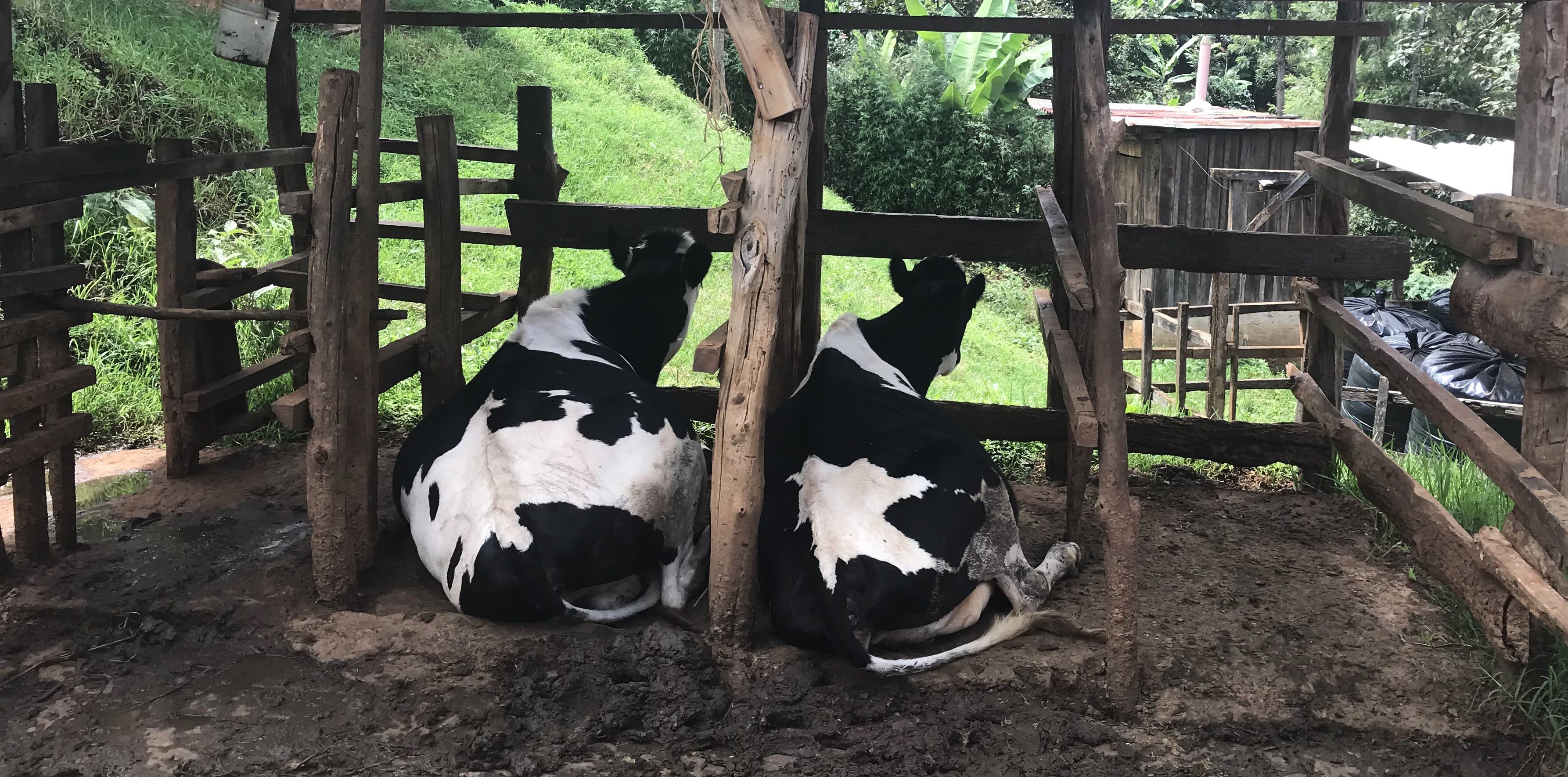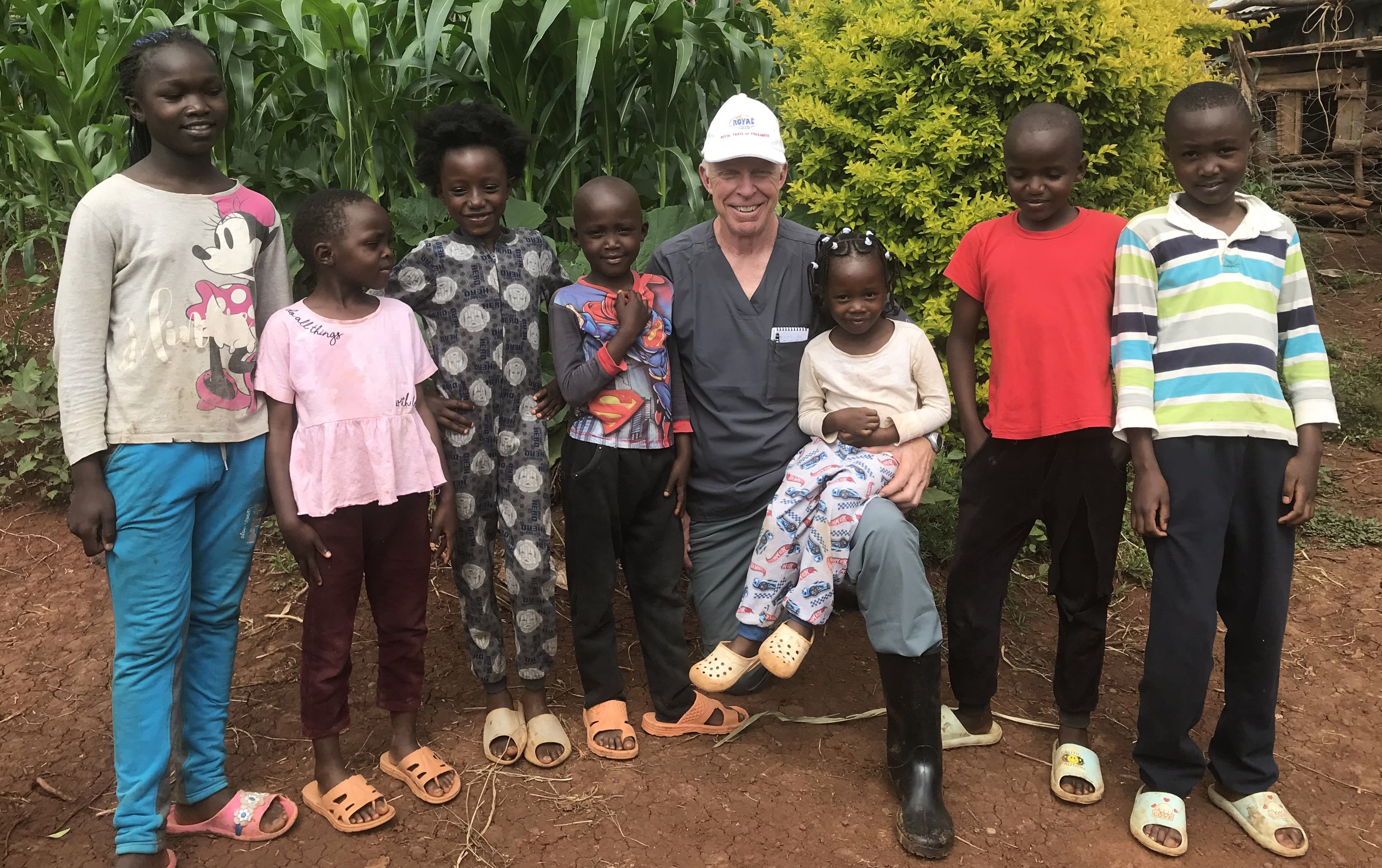#VETSVolunteerVoices aims to bring you the stories of our passionate VETS program volunteers from the field! In their own words, volunteers reflect on their work, development challenges, and the personal growth that they have experienced during their placements. Learn more about our VETS (i.e., Volunteers Engaged in Gender-Responsive Technical Solutions), program and the important work being carried out by Canadian volunteers and local partners in Cambodia, Ghana, Kenya, Laos, Senegal, and Vietnam.
 VOLUNTEER NAME: Dr. David Douglas (DVM)
VOLUNTEER NAME: Dr. David Douglas (DVM)
PLACEMENT: November-December 2023, Kenya
DATE OF INTERVIEW: January 26, 2024
Q: What motivated you to be a VETS Volunteer?
A: A former colleague and VWB volunteer, Dr. Gerald Dykstra, shared details about a VWB opportunity at Wakulima Dairy in Kenya with our veterinary clinic. After conversations with Gerald and Dr. Shauna Richards (another former VWB volunteer), my interest grew. With over 40 years in dairy practice, I felt semi-retirement afforded me the time needed to truly understand the dairy culture in Kenya and the daily challenges faced by farmers. Also, the 6-week duration seemed ideal for immersing myself in the field and providing practical insights alongside the Wakulima extension team.
I've had previous experience working with the International Livestock Management School across various countries like Latvia, Ukraine, Russia, Brazil, Columbia, and Mexico. Each encounter, working closely with farmers, veterinarians, and farm managers, was both fulfilling and enlightening. Embracing diverse cultures and collaborating with individuals across the dairy industry deeply resonated with me.
Q: Could you describe your role and responsibilities in Kenya?
A: My primary role was to support and advise the 10-member extension team at Wakulima Dairy, which serves approximately 8,500 dairy farmers. This involved offering guidance on various aspects such as feeding, housing, agronomy, and animal care through both individual consultations and group meetings.
Q: Walk us through a typical day during your placement.
A: A typical day kicked off around 9 AM with a trip to Wakulima Dairy to meet with the assigned extension representative. While I presented on mastitis at a few information sessions, most days were dedicated to farm visits scheduled by the extension team. We'd move from farm to farm, discussing improvements in cattle comfort, particularly focusing on stall size, ventilation, flooring, and bedding. Additionally, I began routinely measuring youngstock, recognizing a need for better advice on heifer rearing.
Q: Did this experience leave a lasting impact on you?
A: Absolutely. Witnessing the relentless work ethic of the Kikuyu farming community, especially the women, was eye-opening. Their daily routine, often starting before dawn and revolving around manual labor, highlighted the resilience and dedication required in dairy farming. It made me more mindful of the additional burden my recommendations might pose, considering their already demanding lifestyle. Moreover, experiencing firsthand the profound impact of weather, particularly during a historic drought, underscored the fragility of their livelihoods.

Q: What were the key insights you gained from your time in Kenya?
A: My experience shed light on the remarkable progress made by farmers, thanks to initiatives like the Wakulima extension program. The progress from subsistence farming to implementing improved feeding practices and feed storage was clearly evident. However, deeply ingrained traditions, such as reserving corn for human consumption, posed challenges. The fact is that farms feeding corn stover (without the corn) are not able to make much milk, whereas farms that have good corn silage have cows in better condition and milk year-round. Yet, tradition persists. Additionally, issues like cattle housing and youngstock rearing emerged as recurring themes, signaling areas ripe for further intervention and education.
Q: In your opinion, what are the strengths of the VETS program in Kenya?
A: The VETS program, particularly at Wakulima, boasts a robust extension framework led by individuals like George Muita. The receptiveness of the extension team and farmers alike facilitated effective knowledge exchange. The manageable scale of Wakulima Dairy allowed for extensive farm visits, fostering personalized interactions and targeted interventions. I found the one-on-one engagements especially valuable, providing a deeper understanding of farm-specific challenges and facilitating tailored solutions.
Q: How does the VETS program contribute to gender equity in Kenya?
A: The "Champion Farmer" project at Wakulima exemplifies strides toward gender equity by empowering women in dairy farming. Through targeted support and training, selected women on smaller farms have been enabled to enhance their role in agricultural productivity. In turn, these women provide information on dairy production to other farmers in their community / area. Encouraging greater female participation not only promotes economic empowerment but also enriches the fabric of rural communities.
Q: How did you contribute to farmers' understanding of "cow comfort"?
A: My approach to enhancing cow comfort revolved around addressing prevalent issues such as inadequate stall size, poor ventilation, and subpar flooring. During farm visits, I noticed that many small-scale cow farms shared similar housing facilities, characterized by cramped stalls and insufficient airflow. Recognizing the importance of a comfortable environment for cattle, I dedicated considerable time to measuring stalls and offering practical advice to improve welfare and, consequently, milk production.

At times I used a hammer to clear obstructions, or I dug up packed dirt stall bases to demonstrate optimal bedding conditions. I also routinely asked owners and extension reps to do the “knee drop test” (where we drop to the floor on our knees to test stall base softness), but no one took up the challenge. It’s a simple test, and if you think about it, we ask cows to drop to their knees every time they lay down!
Additionally, I emphasized the importance of heifer management (so they can begin milk production before 2 ½ years of age) and provided guidance on optimizing calf housing conditions for better growth and productivity. I learned that the extension recommendation for calf housing is wooden slats, so I explained that calves still require something smooth to lie on, and they also require a reasonable amount of space to move around in. These are important factors in a young cow’s basic welfare and wellbeing.
Q: Could you share a personal experience from your time in Kenya that left a significant impression on you?
A: Midway through my placement, I accompanied Rebecca Ndembo, an extension team representative, on several farm visits. She was very distressed that day and showed me pictures of her cow which had died the previous evening. She desperately wanted to know why her cow had died and was asking me for my opinion. To me, it appeared to be an intestinal accident – for which there is unfortunately no treatment. But what lingered with me that day was her anguish over the loss of a single cow – that cow constituted her entire herd. In small-scale farming, each animal is profoundly significant. In retrospect, this encounter underscores the stark contrast in perspectives on livestock loss between developed and developing contexts.
Q: What advice would you offer to someone considering a VETS volunteer placement?
A: For aspiring VETS volunteers, I'd emphasize the profound rewards awaiting you. While my primary aim was to impart knowledge to Wakulima farmers, I found myself gaining invaluable insights in return. It's crucial to convey recommendations in a way that resonates with farm owners, urging them to understand the logic behind each suggestion. Throughout my journey, I often encouraged farmers to adopt a "Think like a Cow" mindset, facilitating a deeper understanding of their animals' needs.
What struck me most was the genuine hospitality of the local community. Despite their modest means, gestures like offering food were heartfelt expressions of gratitude, and I learned to accept them graciously. Additionally, interacting with children, a common sight on every farm, added an unexpectedly meaningful dimension to my experience.
My advice to future volunteers? Embrace the local culture wholeheartedly and cherish the unique experiences offered by volunteering abroad. These moments of cultural immersion and community connection are priceless, and they will grow you both personally and professionally. Soak up every opportunity to learn and engage. You're in another part of the world, one you likely wouldn't see otherwise so enjoy the culture and the journey!

VETS is a 7-year initiative (2020-2027) to improve the economic and social well-being of marginalized people, particularly women and girls, in 6 countries across Africa and Asia. In collaboration with local partners, the program is implemented through 190 Canadian volunteers on international assignment and is generously funded by Global Affairs Canada. Learn more.





